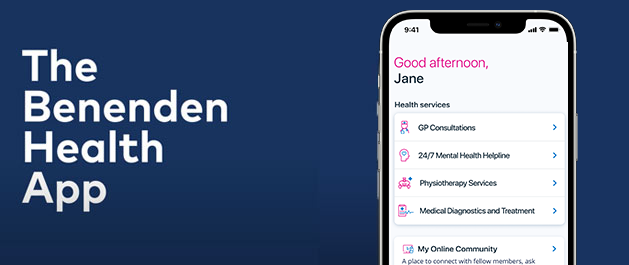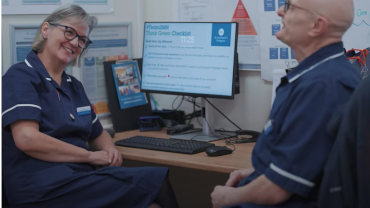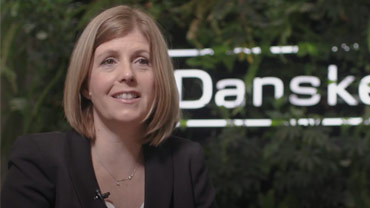Business Healthcare
Affordable private healthcare
At Benenden Health, we make supporting the health and wellbeing of your employees affordable. And it doesn't have to cost the earth.
For only £15.50 per employee, your employees will have immediate access to services such as:
- 24/7 GP and Mental Health helplines.
- Mental Health Support.
- Private Medical Diagnosis and selected Surgical Treatment.
- Physiotherapy.
- Cancer Advice Support and more.
Now that's healthcare done different
No medical questionnaires or complicated quotes means less admin time for you.
With us, you get a cost-effective way to support employee wellbeing, reduce absence, and enhance your benefits offering.
Putting people first since 1905.
Download our Healthcare for Business brochure
Find out about our products and services:
- The benefits of investing in employee health and wellbeing.
- About Benenden Health.
- What’s included in our business healthcare.
- Employee rewards and discounts.
- The Benenden Health App.
- How we've helped other businesses.
We can support your employees during the bigger things, like unexpected illnesses, and the smaller things like their day-to-day health and wellbeing. And when your workforce is supported, your business is stronger from the inside.
Improve staff retention and attract new employees.
Increase productivity and morale.
Reduce absenteeism and presenteeism.
Protect the most valuable asset - your people.
Our Healthcare also has minimal Benefit in Kind (BiK) implications for your business.
50% of employees say a strong health and wellbeing package would increase their likelihood to join a business.
Business healthcare benefits can:
- Increase employee engagement.
- Motivate employees to stay in their current job.
- Help to make your employees feel valued and rewarded.
- Create a culture of trust.
- Improve physical and mental wellbeing.
Business healthcare only £15.50 per employee per month.
Need help in making the case for affordable private healthcare?
We know that the peace-of-mind that comes with Benenden Health is great for all your employees. However, if you need a bit more help in making the case for affordable private healthcare in your organisation we can help.
Get your team back on their feet
We've partnered with ITV to help stop health issues bringing your teams' lives to a grinding halt.
Press play on your team's health with a wide range of healthcare services.
From 24/7 GP access to selected private treatments, Benenden Health helps you look after your people – without stretching your budget.
Press play on your people's health.
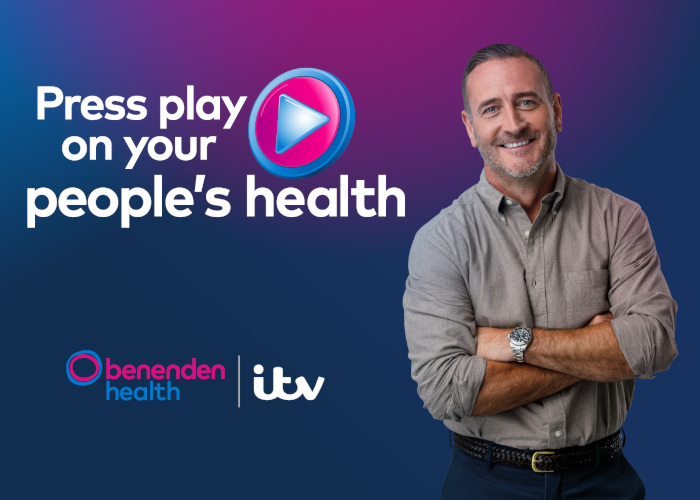
"It’s been a massive success"
"Staff really appreciate having access to healthcare that supports them in everyday situations, as well as in those more serious times when greater help and advice is needed. During periods of worry, it’s good to know that you can access professionals who can give you answers quickly."
Rachel Whiteley, HR Business Partner at internet service provider Zen
Supporting the health and wellbeing needs of over 870,000 members and 1,000s of businesses




Ready to get started?
Discover how we can help you improve the wellbeing of your employees through our private healthcare.
Call us for FREE on 0800 414 8179 or
Services your employees can request from day one of membership
There are so many ways that our business healthcare can support your employees health and wellbeing. Benenden Health membership includes access to a range of services.
Your Benenden Health App
Access the benefits of membership on the go
Access 24/7 GP services and request support through our Mental Health helpline.
Request access to Medical Diagnosis and Surgical Treatment, and click-to-call to request Physiotherapy.
Use the Wellbeing Hub to access a wide-ranging choice of articles, videos and recordings to support your mental wellbeing, fitness and nutritional needs.
Join our Online Community and connect with like-minded members, share experiences and hints and tips.

Employee Rewards and Discounts**
Benenden Healthcare for Business is there to help your employees with everyday life.
Your employees can access a whole host of member rewards.
Here are some of the current discounts your employees can enjoy:
- Rolling discounts on motoring and hotels.
- Up to 40% off on cinema tickets.
- 25% discount at thousands of beauty locations nationwide.
- Discounts on everyday shopping at major retailers.


Ready to get started?
Discover how we can help you improve the wellbeing of your employees through our private healthcare.
Call us for FREE on 0800 414 8179 or

** Terms and conditions apply to all benefits. See My Benenden Rewards website for details. Offers subject to change without notice. My Benenden Rewards is managed and run on behalf of Benenden Health by Parliament Hill Ltd.
Review our frequently asked questions

Ready to get started?
Discover how we can help you improve the wellbeing of your employees through our private healthcare.
Call us for FREE on 0800 414 8179 or
What our business customers say about us
Benenden Healthcare for Business looks after businesses of all shapes and sizes, and could add value to your business, but don't just take our word for it. See how we've helped other businesses.
"I'd have no hesitation in recommending Benenden Health."
Saint Michael's Hospice, Hastings and Rother
Watch Head of Organisational Development, Andy Brown, explain how Benenden Health supports their employees health and wellbeing, allowing staff to return to work quickly following sickness absence.
Video length [3:11]
"An awesome range of support to staff."
Royal Berkshire Fire and Rescue Service
Watch Helen Morbin, Wellbeing Manager for the Royal Berkshire Fire and Rescue Service, explain how Benenden Health fits into their approach to employee wellbeing and helps contribute to reducing the cost of their sickness absence.
Video length [2.46]
We're rated 'Excellent' by Trustpilot
Our workers can access medical support to get them back to full health much quicker than relying on under-strain NHS services and this has enabled us to develop a happier and healthier workforce and a productive business.
As such, we value our partnership with Benenden Health very highly and ensure we promote it to employees and their families on a regular basis, to make sure they are not missing out.
Tim Williams, Strategic HR Business Partner at Parcelforce Worldwide
After four weeks of trying to navigate my local GP surgery e‑consultation system and getting nowhere, I remembered I have Benenden Health through work and could access a GP 24/7.
I phoned today and booked an appointment, had my telephone appointment and collected my prescription all within a four-hour period. What an excellent service you provide.
Thank Benenden Health and thank you to my employer for signing us up.
Fiona, Benenden Health member since 2021
Here are just some of the businesses we work with

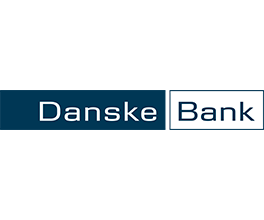
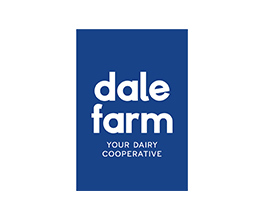

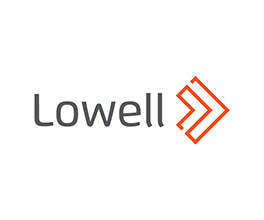
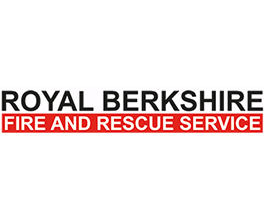
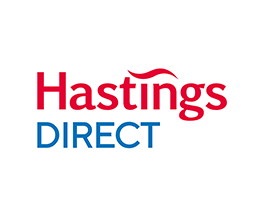
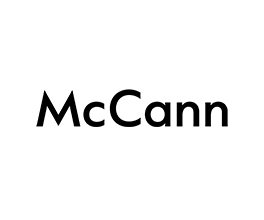


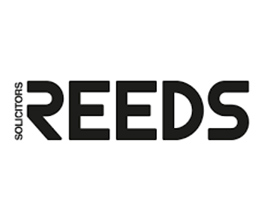
Do you need help with your wellbeing strategy? Do you have high mental health absenteeism? Our industry reports and guides are designed to help and support the needs of your business.

Our guide to developing a health and wellbeing strategy
- Create a wellbeing programme that attracts the best talent and makes your employees feel healthy, happy and valued.
- Support and guidance to put your strategy into practice.
- Understand the challenges to find the health and wellbeing initiatives that resonate with your people.

Ready to get started?
Discover how we can help you improve the wellbeing of your employees through our private healthcare.
Call us for FREE on 0800 414 8179 or
Great! You're at the start of your journey to happier and healthier employees.
Got a team of less than 50 employees?
You can now set up online. Follow the steps below to get started.
Or if you'd like to speak directly with our team, then we're happy to help: Call us on 0808 271 2313 or send us a message.
Got a team of more than 50 employees?
If you want to set up more than 50 employees, please speak to our dedicated team.
They will guide you through a smooth and simple set-up: Call us on 0808 271 2313 or send us a message.
Alternatively, if you've got questions, our live chat is also available.
Available 9am-5pm, Monday-Friday (excludes Bank Holidays).
Before you get started, here’s some key information you'll need to know:
Got any questions?
Contact us via Live Chat, call us on 0808 271 2313 or send us a message
What's next
Three simple steps
-
Tell us more about your business
The first step is to complete a short form which will provide us with more information about your business.
We'll then use this information to fill in an Application Form that we'll share with you to check and sign.
-
The important stuff
Next, we'll send you key documents which will explain all about Benenden Healthcare for you to review. We’ll also provide our Group Scheme Terms and Conditions and an Application Form we’ve filled in for you to check and sign.
Please read all these documents carefully to ensure that Benenden Healthcare for Business is the right choice for your organisation.
-
Getting ready to go live
Finally, once you've signed the Application Form, we'll send you a certificate confirming your acceptance as a Group Scheme for Benenden Health.
To get membership started you just need to upload details to the Corporate Portal.
We'll send you a Corporate Portal how-to guide along with resources so you can let your employees (and their family) know all about their healthcare. Your employees will each receive their own Benenden Health welcome pack too!

